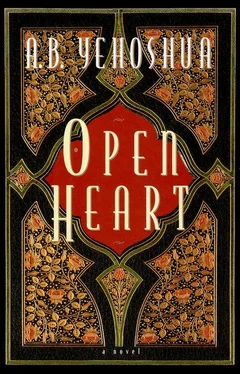A. Yehoshua - Open Heart
Здесь есть возможность читать онлайн «A. Yehoshua - Open Heart» весь текст электронной книги совершенно бесплатно (целиком полную версию без сокращений). В некоторых случаях можно слушать аудио, скачать через торрент в формате fb2 и присутствует краткое содержание. Год выпуска: 2014, Издательство: Peter Halban, Жанр: Современная проза, на английском языке. Описание произведения, (предисловие) а так же отзывы посетителей доступны на портале библиотеки ЛибКат.
- Название:Open Heart
- Автор:
- Издательство:Peter Halban
- Жанр:
- Год:2014
- ISBN:нет данных
- Рейтинг книги:3 / 5. Голосов: 1
-
Избранное:Добавить в избранное
- Отзывы:
-
Ваша оценка:
- 60
- 1
- 2
- 3
- 4
- 5
Open Heart: краткое содержание, описание и аннотация
Предлагаем к чтению аннотацию, описание, краткое содержание или предисловие (зависит от того, что написал сам автор книги «Open Heart»). Если вы не нашли необходимую информацию о книге — напишите в комментариях, мы постараемся отыскать её.
Open Heart — читать онлайн бесплатно полную книгу (весь текст) целиком
Ниже представлен текст книги, разбитый по страницам. Система сохранения места последней прочитанной страницы, позволяет с удобством читать онлайн бесплатно книгу «Open Heart», без необходимости каждый раз заново искать на чём Вы остановились. Поставьте закладку, и сможете в любой момент перейти на страницу, на которой закончили чтение.
Интервал:
Закладка:
“But why? Can’t you give him a pill?” she asked with a naïveté that touched my heart, which was still excited by the sight of her eyes — eyes that I had seen without their glasses only when I had made love to her. “Of course,” I said confidently. “Why not? Even if it’s only a slight temperature, why should he suffer?”
But I was not worried about Lazar’s temperature. My thoughts turned stubbornly around the possibility of ventricular tachycardia, which could suddenly turn into ventricular fibrillation. The charts at the foot of Lazar’s bed contained the records of a considerable number of EKGs that had been done since his operation. I picked them up to examine them in the full moonlight of the autumn night and immediately noticed longer runs of a rapid, ectopic beat, five to six in a row, whose shape was obviously different from the regular and dominant sinus rhythm, which made me think they were of ventricular origin. Imperfect as it was, my knowledge of cardiology was enough to arouse my fears and give me a powerful urge to photograph these EKG strips and take them with me to the library tomorrow to study them, or even to go up to Jerusalem after my night shift and show them to Professor Adler, to hear what the master had to say. Perhaps for the first time since I had begun work at the hospital, I felt so powerfully convinced of something that it was only my youth and inexperience that prevented me from getting in touch with Professor Hishin right then, in the middle of the night, and expounding my interpretation of the data to him, an interpretation that was so obviously right that only it could save us from the catastrophe threatening to descend. But I had left my post in the emergency room for some time and was concerned that I might have been missed. I went to the nurses’ station at the end of the corridor and signed an order for two paracetamols for Lazar and one 5 milligram of Valium for his wife, and after seeing them swallow the pills I left them with the promise to come again tomorrow afternoon, because I knew that in spite of the confidence they felt in their professor friends in the hospital, they had also developed a kind of hidden dependency on the young doctor who had accompanied them to India.
Therefore, after waking up late the next morning, I did not drive to Jerusalem as I had promised to help my parents with Shivi, who, although my mother assured me she had been no trouble at all and was giving them a lot of joy, was still a handful for two older people to look after by themselves. I phoned them and apologized profusely. And since I didn’t know how to explain, even to myself, the nagging anxiety I felt about Lazar and the need I felt to stay close to the hospital, and I didn’t want to lie to them, I told them the truth without going into any medical details, and these two rational and realistic people had to be content with mysterious premonitions and to rely on the trust that they were accustomed to having in me. Six hours before my shift began I was already back at the hospital, where I went to the library to consult the EKG and arrhythmia teaching manuals used by nurses in cardiac intensive care courses. But no clear conclusions emerged from my reading. It appeared that there were atrial beats which could look like ventricular beats. The uncertainty only increased my anxiety, whose source was now less clear than ever. I went to the coronary intensive care unit and looked at the EKG strips of patients with acute myocardial infarction taken over the past few hours, and when there was a quiet moment I asked the doctor in charge to show me EKGs showing clear runs of ventricular tachycardia. Equipped with these strips, I went up to the ninth floor to see how Lazar was doing. In the cafeteria I had already heard from two psychiatrists who had visited him that morning that he looked and acted “like a man-eating tiger,” and that tomorrow or the next day he would probably be sent home, and the week after that he would presumably be back in his executive chair with his hands once again on the reins.
The two psychiatrists spoke about him with anger and bitterness, for Lazar had turned their well-meaning visit into a power struggle over his new initiative to do away with the psychiatric department in the hospital and turn it into an outpatient clinic — a community mental health service. “Let them take their mental illnesses somewhere else, we don’t need them here,” he said, smiling from his bed, when I told him about the psychiatrists’ angry reaction to his ideas for their department. The private room, which I had last seen bathed in moonlight, full of the intoxicating scent of flowers, had already been transformed into a kind of office, with two telephones on the floor and a pile of files next to his food tray. Levine was still trying to keep the stream of visitors at bay, but Hishin, who was standing next to Lazar’s bed as large as life and twice as tall, was perfectly satisfied with the new energy displayed by his patient. Lazar’s temperature had gone down, the bandages had been removed, and through the hospital pajamas the straight row of neat stitches was clearly visible. Dori was sitting in the corner, listening smilingly to Lazar’s secretary’s chatter. She was heavily made up, wearing an elegant suit and high heels; it seemed that she had already spent a few hours in her office and had also done some shopping, judging by the plastic bags heaped at her crossed feet. I suddenly turned to her, rudely interrupting the secretary. “Are you going to spend the night here again?” She nodded her head in surprise, as if I should know that she preferred the discomfort of sleeping in an armchair to being separated from her husband and spending a lonely night in her bed. A consoling thought crossed my mind, light as the touch of a feather. In spite of everything, there had not yet been one ugly moment between us. And a powerful wave of love swept over me for this middle-aged woman, who boldly took out a cigarette and lit it in the closed room, to the horror of Professor Levine, who came into the room at that moment and held out both his hands to her in an imploring gesture, to stop her from poisoning us all.
Was it possible that in the depths of my heart I wished for Lazar’s death? This secret thought, which held a certain sweetness, and which had been stubbornly simmering inside me ever since the flight home from Rome, now seized hold of me again and forced me to go out to the little balcony and bend over the railing as if I wanted to spew it out of me once and for all. Levine drew Hishin onto the balcony to show him the results of some tests which had just arrived, including the left ventricular function using a technetium radioactive scan. Hishin took off his glasses and ran his eyes rapidly over the results. He looked completely calm. “It’s so predictable,” I heard him exclaim in his loud, confident voice. “You don’t need to be a cardiac surgeon to know that the heart muscle is still stunned from the surgery and the prolonged use of the cardiopulmonary bypass machine. That explains the poor function.” But Levine, whose voice was too low for me to hear his arguments, appeared to be insisting on something. Hishin listened attentively, but without appearing to be convinced. “All right,” he said, “we’ll keep him until the end of the week and repeat all the tests in ten days’ time. And if the cardiac function is still unsatisfactory, we’ll take him to Jerusalem to Bouma and see what he has to say.” Levine nodded, but he didn’t seem satisfied. Suddenly he fixed his blue eyes on me standing in the corner of the balcony, the EKG strips in my hand, and trying not to look as if I were dying to intervene in their conversation. Levine beckoned me to approach. I took a few steps, and to my astonishment he touched my arm in a friendly gesture, and in his deep, serious voice, his eyes on the strips in my hand, he said to Hishin, “Listen to what Dr. Rubin has to say, Yosef. You were the one who was so impressed with him that you chose him out of all the residents in the hospital to go to India. Tell Professor Hishin what you think about Lazar’s arrhythmia.” I was so overwhelmed by Levine’s gentle touch on my arm and by the friendly tone in which he spoke that at first I was confused and stammered incoherently, but gradually I organized my thoughts and even added a few new elements I had picked up a couple of hours before in the coronary intensive care unit. Hishin listened to me with a paternal smile, but he seemed to be enjoying the vigor with which I expounded my views rather than following what I had to say. “And you let a resident like Benjy slip through your fingers?” he said to Levine when I had concluded my argument. “It wasn’t up to me,” said Levine in tone of real regret. “It was up to him.” And with this the medical debate ended before it had even begun, just as Lazar’s two children, Einat and the boy, now a soldier in uniform, entered the room and were enthusiastically greeted by all those present.
Читать дальшеИнтервал:
Закладка:
Похожие книги на «Open Heart»
Представляем Вашему вниманию похожие книги на «Open Heart» списком для выбора. Мы отобрали схожую по названию и смыслу литературу в надежде предоставить читателям больше вариантов отыскать новые, интересные, ещё непрочитанные произведения.
Обсуждение, отзывы о книге «Open Heart» и просто собственные мнения читателей. Оставьте ваши комментарии, напишите, что Вы думаете о произведении, его смысле или главных героях. Укажите что конкретно понравилось, а что нет, и почему Вы так считаете.












